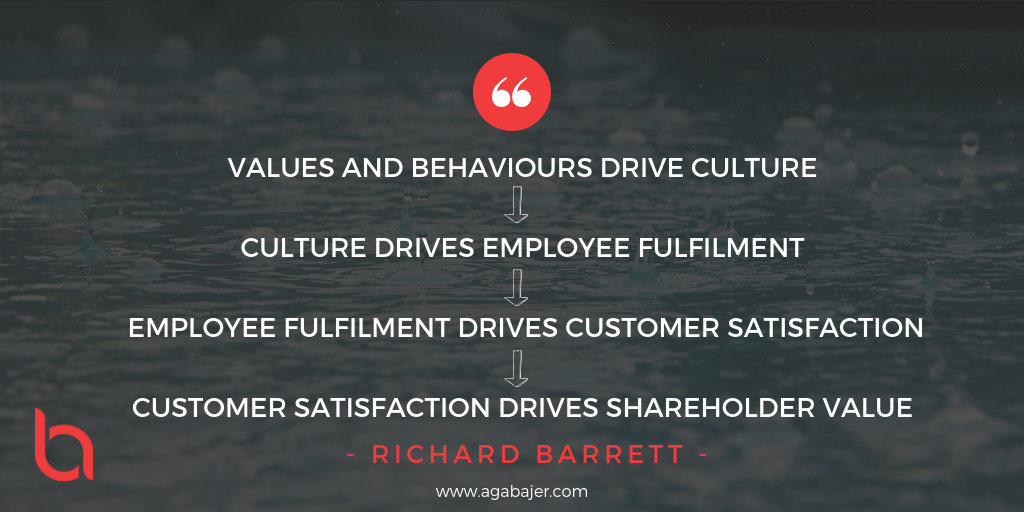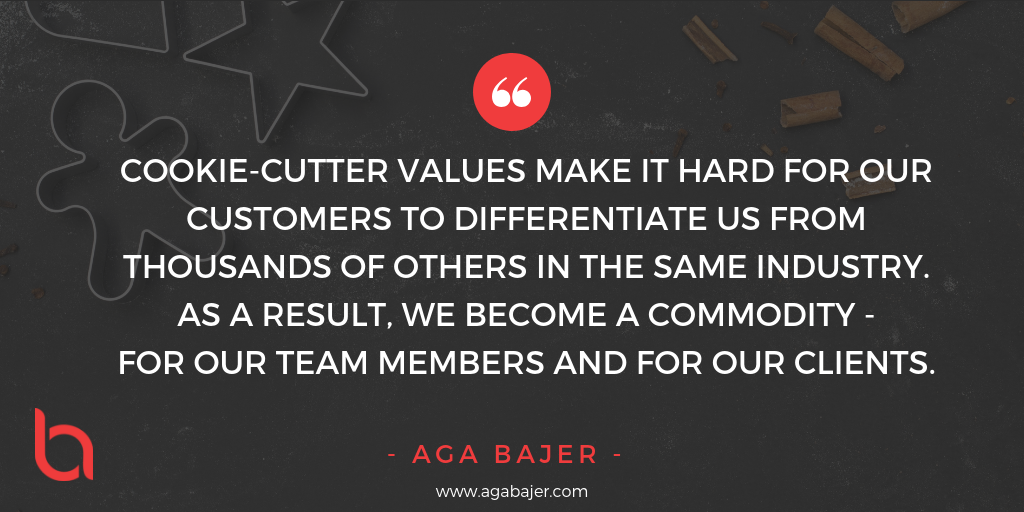
What to Do When You Suspect That Your Company Values Might Have Zero Value
Few people today would question the necessity of having clear corporate values.
At least, not in theory.
Research shows that companies with cultures driven by meaningful values generate higher performance and achieve better results.
One of my favourite illustrations of why values are so important can be found in Richard Barret’s article: “The Importance of Values in Building a High Performance Culture.”
Barrett says:
Values and behaviours drive culture, culture drives employee fulfilment, employee fulfilment drives customer satisfaction, customer satisfaction drives shareholder value.

Allergy warning
In spite of such a strong case for values driving the business, a lot of people in organisations today will give you an eye-roll at the mere mention of the word “values”.
Based on people’s reactions, you’d think that some companies should consider issuing a warning:
Please be advised that our values statement may contain common allergens, such as platitudes, cliches, truisms, and half-truths.
At a closer inspection, It seems that main problem with the values conversation is that while almost all companies nowadays have values statements, the values they declare rarely live up to what they are supposed to be:
Deeply held principles, ideals, or beliefs that people hold or adhere to when working with others, serving clients and making decisions.
The three main reasons why companies end up with values that have very little value are the following:
- Resorting to “cookie-cutter values”
- Failing to consider their ideal customer
- An impossible-to-ignore gap between espoused and lived values
Reason #1: Resorting to “cookie-cutter values”
One-size-fits-all is a misguided concept, especially when it comes to values.
And yet, the majority of companies today somehow bought into it.
At a closer inspection, FTSE 100 companies’ values are… almost identical.
Booz Allen Hamilton and Aspen Institute’s Business and Society Program researchers discovered that most companies’ values incorporate very similar words and ideas:
- 90% of reference ethical behaviour or use the word “integrity”
- 88% mention commitment to customers
- 76% cite teamwork and trust
Teamwork, integrity, customer-centricity, honesty, and respect could be a potential fit for any company – and that’s exactly why THEY SHOULD BE AVOIDED.
Here is why:
We belong to a social species called homo sapiens and we are genetically programmed to form tightly-knit communities with a strong sense of uniqueness, connectedness, and belonging.
Our programming to develop and project a clear and visible identity is natures’ way of ensuring the survival of the species.
To this day, we are equipped with the same survival mechanism that we inherited from our ancestors – we are wired to look for how our tribe is different from other tribes.
Our brains continually scan for easily identifiable attributes that signal – “this is us” and “this is them.”
And in the absence of unique, strong, stand-out values, we lose our ability to develop a true sense of belonging.

Cookie-cutter values make it hard for our customers to differentiate us from thousands of others in the same industry. As a result, we become a commodity – for our team members and for our clients.
What you can do now
If you are not sure if you are guilty of having cookie-cutter values, just ask yourself and your team members:
- How many of our competitors have exactly the same values as we do? (Even if it’s just one, it’s one too many!)
- What are the values we hold dear that make us unique, successful, and easily identifiable?
- What happens here that wouldn’t happen anywhere else? What values does it point to?
Reason #2: Failing to consider your ideal customer
In his interview on the CultureLab podcast, Dave Ulrich told me:
Value is in the eyes of the beholder.
He implored our listeners to ask themselves: “What are the values that our customers want us to have?” and “What is truly important, even critical for them?”
Average companies can’t answer these questions well. They lack clarity as to who their ideal customer is and have only a very vague idea of what their existing customers truly want.
Great companies, on the other hand, have an intimate understanding of their clients’ worldview and their needs, wants, and values. They don’t care about delivering an average experience to an average customer but they are deeply passionate about delivering an outstanding experience to the right kind of client. The one they want to serve.
A great example of such a company is one of the fastest-growing European hotel chains, Motel One.

Motel One is a design-led budget hotel chain whose creators asked themselves – what are the things that a business traveller truly values?
The result – a hotel that is so unique it plays in its own league: properties in prime locations, all rooms equipped with top quality mattresses, towels, hair-dryers, top technology flat screen TVs – and all this at a budget price mark.
Each Motel One property has beautifully designed, modern common areas where you can have a business meeting or just relax after one.
Why spend so much on all these details, especially when you are not charging a premium price? Because these seemingly small details enable their clients to get what they truly value when travelling – ease, speed, low fuss, high comfort.
Why strip everything else down to the bare essentials? Because it’s not what their clients value or want.
What you can do now
If you are not sure what your clients value, go and find out! Your values should not only reflect what is important to you but also what is important to your best clients – the ones that you love serving and working with.
Here are some questions you can ask yourself:
- Who is our ideal customer?
- What is their worldview?
- How about their personal identity?
- What do they really care about?
- What do they want?
- What do they need?
- What are they afraid of when it comes to your products or services?
- How do you address their needs, wants, and fears?
Reason #3: An impossible-to-ignore gap between espoused and lived values
Espoused values are the ones we declare to be important to us. The lived values are the ones that we see demonstrated in how people operate and how they make decisions every single day.
Our business world today is facing a prevalent and chronic disconnect between “what we say” and “what we do.” The values featured on company posters are often completely different from the values that people actually live on a daily basis.

This gap between the espoused and lived values is probably the main reason for the widespread disenchantment with corporate declarations of “what we stand for.”
Volkswagen, Equifax, or United Airlines are well-known cautionary tales about the consequences of not walking the talk.
There are thousands of others, still anonymous today, who pay lip service to the very values that are being violated by management and employees alike on a daily basis.
What you can do now
If you are not sure whether you want your values to guide all your decisions and the way you manage and operate your business, don’t even bother identifying them. And definitely, don’t talk about them too much. Doing so will only breed cynicism and contribute to your people’s disengagement.
If you are not sure how big the gap is between espoused and lived values, ask your people:
- What is more important than profit?
- What gets people promoted here?
- What would get someone fired?
- Who is presented as a hero or a role model? Why?
- What is the focus of the majority of your meetings? Why?
When you get the answers, compare the themes that emerge to what’s in your core values statement.
If they are not the same values, you have a gap.
You will either have to change your values statement or figure out how to bridge this gap. The sooner you do it, the better.
I’m curious to hear your thoughts on this subject. Ping me on Twitter or on LinkedIn.
Photo by Neven Krcmarek on Unsplash
Want more tips on evolving culture?
Subscribe to my newsletter, the CultureLab Insider, and get the new blog posts, podcast episodes
and other free resources delivered to your inbox every Tuesday.
